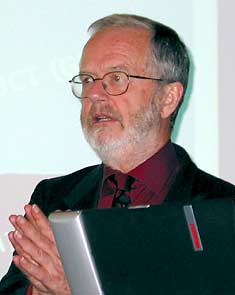UC Berkeley Web Feature
A billion new consumers: Future challenges to the planet's sustainability
 Norman Myers (Kathryn Stelljes photo) |
BERKELEY – More than a billion new consumers are about to join us, and they will have a dramatic environmental impact. Norman Myers, who has been called the Paul Revere of the environmental movement, brought that message to campus as the guest lecturer at this week's William Main Distinguished Visitor lecture by the College of Natural Resources' Center for Forestry.
With the rapid development of countries such as China, Mexico, South Africa, India and Brazil, the poverty of the past is giving rise to a new global middle class, said Myers.
While Myers noted that the swift rise from poverty has vastly improved the lives of millions, he also sounded cautionary notes on what could happen if all global consumers follow the same path as those in wealthy nations such as the U.S. And, he said, wealthy countries themselves need to take a hard look at their resource consumption.
"We in the rich world can't start being critical of folks on the horizon unless we are setting a massive, undeniable example ourselves," Myers said.
Myers, who grew up in northern England and earned his undergraduate and masters degrees at Oxford, received his Ph.D. from Berkeley's College of Natural Resources in 1973. He has worked in countries around the world and received many awards for his work in the environmental arena. He is at Berkeley to receive the Haas International Award, to be presented at the campus Commencement Convocation ceremony on May 13.
Myers said that the Earth's extremely well-off currently number about 850 million in a world of 6.1 billion. He said an additional 1.1 billion new consumers could join that total, coming from 17 developing countries, including 300 million from China.
But the environmental impact of providing houses, food and electricity-powered appliances, televisions and computers to those new consumers could, as Myers put it, have the world bumping against the ceiling of its natural resources.
Air pollution is already present on a large scale in many developing countries. Automobiles are the fastest growing source of carbon dioxide emissions, which are greenhouse gases.
The impacts are economic, as well. When countries divert a large portion of their grain to livestock feed,which provides beef for middle-class diets, they become dependent on imports – and food which could nourish the poor instead is used to feed cattle to be eaten by their rich countrymen.
If China were to divert one fifth of the grain it is feeding to cattle, Myers said, food would be available for China's 125 million malnourished citizens.
So, Myers asked, how do we get from a consumption-crazy outlook to a more sustainable world? He had these suggestions:

